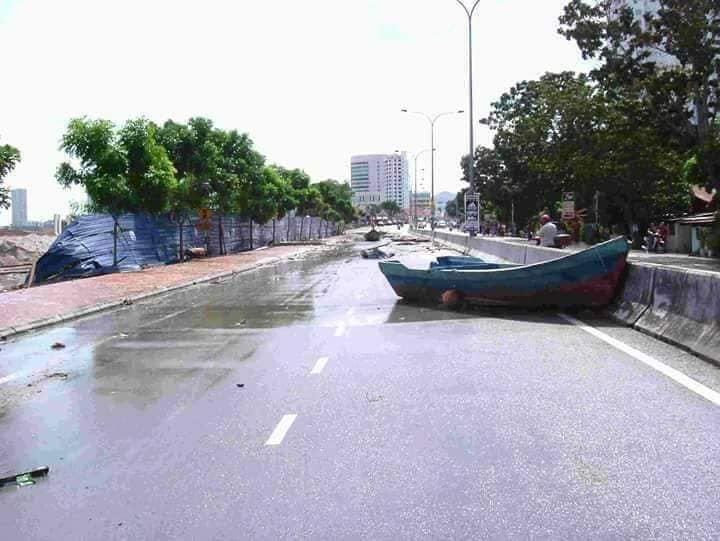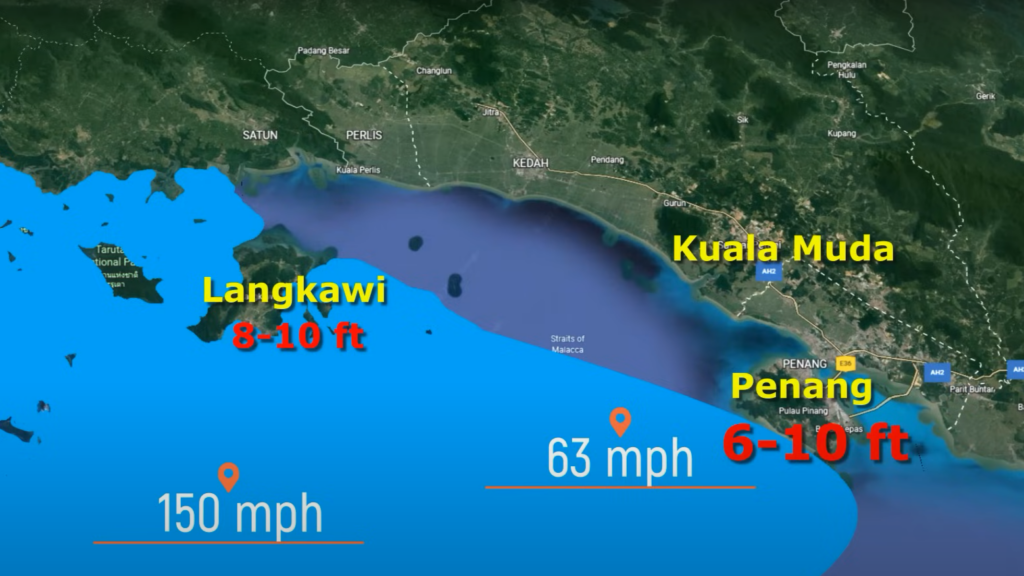KUALA LUMPUR – Today marks 20 years since the devastating Indian Ocean tsunami occurred, a tragedy that took nearly 300,000 lives and displaced millions across 14 countries, just a day after Christmas in 2004.
Yet, much like how the waves which caused such unimaginable loss receded, the memory of that fateful day gradually faded from our minds and hearts.
However, for Alan Keevan, a legal advisor at an asset management firm, the day he lost his mother, K. Sarsuly – also known as Sharon – remains etched in his memory.
Like waking from a dream, the 36-year-old and his family have come to terms with their loss, each in their own time and way.
In tribute to the 68 who perished in Malaysia on that tragic day, Scoop spoke to Alan as he shared – for the first time – a heartfelt and vivid account of what happened 20 years ago in Batu Ferringhi, and how he and his family found the strength to carry on.
Family’s last beach picnic
Recalling his mother’s love for the beach and picnics, Alan and his family – including his mother’s brother, his wife, their two sons, and another cousin from Bidor – arrived at Miami Beach, Batu Ferringhi, around 10 to 11am on December 26, 2004.
It was a Sunday, coinciding with the Catholic Feast of the Holy Family of Jesus, Mary and Joseph.
While several areas in Penang experienced strong tremors that morning following a 9.3-magnitude earthquake which struck off the coast of Aceh, Alan remembered it starting like just another day at the beach.
The shoreline was alive with holidaymakers, and a monkey in a cage nearby provided an unusual distraction as Alan’s family laid their food out on a mat.
Miami Beach was known for its distinctive rocks and large boulders, along with a wall at the back and stairs leading up to the roadside. Makeshift shacks sold food, drinks, and items for beachside activities.
Like many beachgoers, Alan and his cousins headed down to the water for a swim.
“Everything was perfectly fine. I was playing with my youngest cousin, Sharman Nair. He was about 7 or 8 and loved clinging to my back. I’d let him go now and then in the water just to watch him frantically try to grab me again.
“At one point, a man in a boat passed by, yelling and gesturing for us to get out of the water. I couldn’t hear him properly – maybe he shouted the word ‘ombak’ (wave). But no one took him seriously and we carried on playing.”
It was then that the first wave hit. Alan didn’t think much of it at first, as the water only came up to his knees, but the wave surged far enough to reach their food and the monkey in the cage began going berserk.
“My dad hurried us to pack up. Within minutes, the second wave came. From afar, you couldn’t see anything – the sea level looked the same. But as it got closer, you realised it was huge.
“I felt the force when it hit. It was incredibly strong and I was completely submerged. I tried to grab onto a plant but the force uprooted it. My older brother and cousin managed to hold onto the grill above the wall at the back.

“I don’t know if Alvin (his older brother) knew something was wrong, but he was yelling and screaming at the water,” Alan recalled.
“I grabbed onto the grill as well, but my cousin fell into the water. I saw him go under. Thankfully, my other cousin from Bidor reached out and managed to pull him back. We all climbed up onto the wall.”
It was only then that they realised their mother and two sisters were nowhere to be seen. Alan’s father, uncle, and aunt, who had stayed further back, were unharmed.
Alan vividly recalled the chaotic scenes that followed.
“After some time, I saw my sister Asheelaa walking from the other side of the beach, about 200m away. She looked completely lost and in a daze.
“My dad had also lost his wallet, including his police authority card. I could see how helpless he felt. I told him I’d help him find it,” Alan said.
But the scene quickly turned grim as Alan began to notice the extent of the devastation.
“I saw at least five or six dead bodies of people I saw earlier, now washed up lifeless and pale.
“It was strange because I was a St John Ambulance member, but I didn’t even think of performing CPR on them. Everything was so chaotic, the shacks were completely destroyed.”
One moment stuck with him: a man brought Alan’s youngest sister, Ashviinaa, to his father. The man – who disappeared shortly after – had pulled her out of the water, thinking she was his own daughter. Tragically, the man’s daughter had drowned.
30 to 45 minutes later, Alan’s mother was found.
“My dad came up to us and told us to follow my uncle home. He said he would go with the ambulance. I never got to see my mother then.
“Apparently, a rock hit her head, causing her to drown.
“At that time, I didn’t know what to think. Maybe I thought she would be fine once she got to the hospital.
“My brother took it badly, but my sisters were still in shock. I didn’t think too much about it at the time and went home with everyone else.”
Alan shared that it was not until the next day that he broke down in tears, as the reality of losing his mother finally sank in.
It was also the last time the family ever went for a picnic by the beach.

Life 20 years later
According to Alan, the loss of his mother left a void at home, especially since his father, A. John Michael, a police assistant superintendent at the time, was posted in Melaka.
Despite the challenges, the family was fortunate to have a strong support system around them, including relatives, church friends, fellow police officers and their families, as well as one particularly special figure – tuition teacher Cikgu Haq.
Alan explained that his late mother, herself a police officer, had raised her children to be independent from a young age.
“The only reason we could move on was because my mum was a cop too. She made sure we knew how to handle things on our own at home like ironing clothes and doing the dishes.
“But growing up, there wasn’t anyone to bring us together after mum passed. Although we siblings didn’t have any issues among ourselves, we never had heart-to-heart or deep conversations at home.
“My dad really held everything together for us. The sacrifices he made – he was a single police officer who could have remarried but chose not to. He couldn’t move on but I never saw him cry, not even once.
“We were also blessed because so many people supported us – our family members who ensured we had food when they visited, our neighbours at the police quarters, and my tutor, Cikgu Haq.
“After the tragedy, he gave me my first job as a clerk at his tuition centre. He also provided free tuition to me and my sisters,” said Alan, who later pursued a year of law at the University of Hertfordshire in the UK.

Alan’s older brother Alvin Sudesshen took their mother’s passing the hardest but eventually found solace and purpose by following in their parents’ footsteps. He is now a police inspector in Johor, married to Abigail Arasi.
Alvin, who was the closest to their mother, shares a deep connection to her memory.
Their sister Asheelaa, the third sibling, now works in Australia, while the youngest, Ashviina, lives in Penang.
Their father, who retired as a deputy superintendent of police has returned to his hometown of Penang, where he now resides.
The family makes it a point to visit the columbarium in Klang twice a year – on August 10 and December 26 – to mark their late mother’s birthday and death anniversary.
“My mum and dad complemented each other like best friends. When she passed, my dad kept the family together by encouraging us to pray.
“He also made sure we honoured her memory by visiting the columbarium every year.
“You know, my dad actually wanted us to go up Penang Hill that year (2004), but my mum ‘merajuk’ (sulked), so we reverted to a picnic. It’s hard to imagine how things would have been so different if we had gone up,” Alan added.

The memory remains
Understandably, Alan admitted that as time passed, certain details of the tragic incident slipped from his memory.
However, reminders of that fateful day come back whenever he sees a movie about natural disasters or even short clips online.
“I can’t speak for the rest of my family, but when I watch a movie now, I do recall and relive the experience. Yes, it brings back the memories.
“Movies like The Impossible or scenes take me back to that day 20 years ago. It’s funny – I can’t always remember what I did yesterday, but I can vividly go back two decades.
“My memory isn’t great, but that incident is embedded in my long-term memory. It will always be there. I won’t forget that day or the people around me,” Alan shared.
For several years after 2004, the family did not properly celebrate Christmas, but as they slowly came to terms with their loss, they now make it a point to gather every year to celebrate life and one another.
No one ever wishes for such a tragedy to happen, but Alan’s story is one of fate, love, and enduring hope. – December 26, 2024



